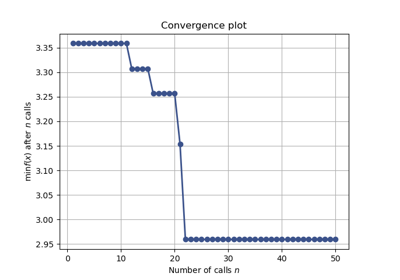skopt.utils.use_named_args¶
-
skopt.utils.use_named_args(dimensions)[source][source]¶ Wrapper / decorator for an objective function that uses named arguments to make it compatible with optimizers that use a single list of parameters.
Your objective function can be defined as being callable using named arguments:
func(foo=123, bar=3.0, baz='hello')for a search-space with dimensions named['foo', 'bar', 'baz']. But the optimizer will only pass a single listxof unnamed arguments when calling the objective function:func(x=[123, 3.0, 'hello']). This wrapper converts your objective function with named arguments into one that accepts a list as argument, while doing the conversion automatically.The advantage of this is that you don’t have to unpack the list of arguments
xyourself, which makes the code easier to read and also reduces the risk of bugs if you change the number of dimensions or their order in the search-space.- Parameters
- dimensionslist(Dimension)
List of
Dimension-objects for the search-space dimensions.
- Returns
- wrapped_funccallable
Wrapped objective function.
Examples
>>> # Define the search-space dimensions. They must all have names! >>> from skopt.space import Real >>> from skopt import forest_minimize >>> from skopt.utils import use_named_args >>> dim1 = Real(name='foo', low=0.0, high=1.0) >>> dim2 = Real(name='bar', low=0.0, high=1.0) >>> dim3 = Real(name='baz', low=0.0, high=1.0) >>> >>> # Gather the search-space dimensions in a list. >>> dimensions = [dim1, dim2, dim3] >>> >>> # Define the objective function with named arguments >>> # and use this function-decorator to specify the >>> # search-space dimensions. >>> @use_named_args(dimensions=dimensions) ... def my_objective_function(foo, bar, baz): ... return foo ** 2 + bar ** 4 + baz ** 8 >>> >>> # Not the function is callable from the outside as >>> # `my_objective_function(x)` where `x` is a list of unnamed arguments, >>> # which then wraps your objective function that is callable as >>> # `my_objective_function(foo, bar, baz)`. >>> # The conversion from a list `x` to named parameters `foo`, >>> # `bar`, `baz` >>> # is done automatically. >>> >>> # Run the optimizer on the wrapped objective function which is called >>> # as `my_objective_function(x)` as expected by `forest_minimize()`. >>> result = forest_minimize(func=my_objective_function, ... dimensions=dimensions, ... n_calls=20, base_estimator="ET", ... random_state=4) >>> >>> # Print the best-found results. >>> print("Best fitness:", result.fun) Best fitness: 0.1948080835239698 >>> print("Best parameters:", result.x) Best parameters: [0.44134853091052617, 0.06570954323368307, 0.17586123323419825]

